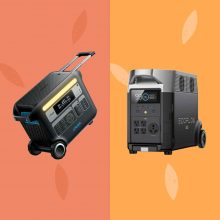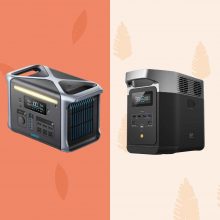
Lithium-ion batteries are projected to dominate the stationary energy storage market by 2030, with a predicted 80% share. – BloombergNEF
Lithium-ion batteries and solar power have become the darlings of the sustainability movement because of their potential to reduce carbon emissions, while also providing a reliable energy source.
In this article, we’ll explore why Lithium-Ion is considered one of the best choices for solar applications, how these technologies work together and what should be considered when picking a battery brand.
Key Takeaways
- Lithium-Ion batteries and solar power are eco-friendly because they can be used over and over again without producing harmful emissions.
- Lithium-Ion batteries can store and deliver energy more efficiently than traditional lead-acid batteries.
- Solar power harness energy from the sun without creating any pollution or greenhouse gases.
- Combining the two technologies allows people to store energy and power all sorts of appliances, from mobile phones to refrigerators.
- Lithium-ion batteries combined with solar power can help homeowners save money on utility bills, while reducing reliance on the power grid.
How Solar Batteries Work
Solar batteries are rechargeable storage devices used to store and manage energy produced from solar panels for later use.
Overview of solar batteries
Solar batteries, also referred to as rechargeable batteries, are used alongside solar panels in order to store excess energy from the sun. During daylight hours, solar power is absorbed by the photovoltaic cells of the solar panel and directly converted into electrical energy which can then be stored in these batteries for later use during nighttime or even when there’s no access to direct sunlight.
There are four main types of solar batteries, and each provides different advantages and drawbacks depending on cost efficiency, lifespan/cycle capabilities and storage capacity.
Types of solar batteries (Lead-Acid, Lithium-Ion, Nickel-Cadmium, Flow)
Solar power systems primarily use four types of batteries: Lead-Acid, Lithium-Ion, Nickel-Cadmium, and Flow. Each has its unique characteristics, benefits, and potential drawbacks. Here’s a comparison:
| Type | Pros | Cons |
|---|---|---|
| Lead-Acid |
|
|
| Lithium-Ion |
|
|
| Nickel-Cadmium |
|
|
| Flow |
|
|
How Lithium-Ion Batteries Work
Lithium-ion batteries consist of an anode, cathode, and electrolyte. When the battery is charged, lithium ions move from the cathode to the anode, where they’re stored. When the battery is discharged, the ions move back to the cathode, releasing energy in the process.
https://www.youtube.com/watch?v=_R1-BqPTdYc
Benefits of lithium-ion batteries for solar power
- Lithium-ion batteries have higher energy density compared to lead-acid and other types of rechargeable batteries, making them ideal for solar power applications.
- These batteries are lighter and more efficient than their lead-acid counterparts, allowing for easier installation and storage in small spaces or hard to reach locations.
- Due to their high capacity lithium – ion batteries offer a much longer lifespan when properly maintained compared to other types of cells.
- Lithium ion can also handle inconsistent charging cycles imposed by intermittent usage patterns common with renewable energy sources such as the sun’s light variation throughout the day.
The global lithium-ion battery market is expected to reach USD 129.3 billion by 2027, with a CAGR of 18.0% from 2020 to 2027. – Grand View Research
Lifespan and cycle capabilities
Lithium-ion batteries have become increasingly popular in solar power systems thanks to their long lifespans and cycle capabilities. On average, lithium-ion batteries can last up to 15 years – significantly higher than other types of battery solutions such as lead acid or nickel cadmium.
The lifespan and number of cycles a battery can handle is dependent on factors such as temperature, depth of discharge, age, ambient temperatures inside the system housing, storage life and number of charge cycles but recent technological advances have improved its stability considerably.
This has enabled them to maintain uniform current output over their entire life span with minimal variation in performance levels depending on the conditions they are subject too.
Typically speaking, most lithium-ion batteries can last two to three years or 300 to 500 charge cycles before their capacity diminishes significantly – assuming that the battery has been properly maintained and stored.
Efficiency and energy density
Lithium-ion batteries are the preferred choice for solar power applications because of their high energy density, allowing for efficient storage and utilization of electricity. They provide more than twice the amount of power per unit weight compared to other battery types such as Lead-Acid and Nickel-Cadmium.
This makes them more suitable, especially in cases where weight is a concern. Furthermore, Li-ion batteries have a 95% conversion rate from solar energy into usable electrical energy, meaning that there less “leakage” during the process of capturing and storing renewable energies via solar panels or similar devices.
With their lightweight design, superior efficiency estimates and uncomplicated installation process; lithium-Ion technology has developed into one of the best (and most popular) charge storage systems available today.
Looking for a portable power station?
Ideal applications for lithium-ion batteries in solar power systems
Lithium-ion solar batteries are ideal for residential and off-grid applications, making them a trusted option for those who need to store energy generated from solar panels. These lightweight and high-energy density batteries offer powerful solutions by enabling homeowners to access more of the energy output from their systems and provide reliable power backups when needed.
For long-term reliability, lithium ion battery banks can be safely scaled up over time without negatively impacting system performance or lifespan.
On top of this, they’re designed specifically with everyday households in mind, offering users full flexibility so that today’s lighting needs don’t have to always mean tomorrow’s energy restrictions.
This makes it possible for both existing and new home owners to expand their current systems as needed – allowing them access to more sustainable forms of energy utilization like renewable resources rather than traditional electricity networks.
Important factors to consider when purchasing lithium-ion batteries
- Expected lifespan – knowing the expected lifespan of lithium-ion batteries is important for calculating return on investment and long-term performance.
- Cost – Lithium-ion batteries are generally more expensive than other battery types, such as lead-acid, but are also more efficient and have higher energy capacities.
- Capacity and Energy Storage – a well configured solar power system will need enough storage capacity to meet the demands of its load/site usage.
- Efficiency – high efficiency of lithium-ion cells have better utilization of stored energy, which results in lower overall cost over time.
- Safety features – thermal runaway protection offered by most battery management systems found on modern Li ion Banks protect against dangerous scenarios should something go wrong within one or multiple cells.
- Compatibility – your chosen charger controller & inverter must be compatible with the type & size/capacity requirements.
Types of Lithium-Ion Batteries Used in Solar Power Systems
There are several types of lithium-ion batteries used in solar power systems, each with their own unique characteristics.
1. Lithium Iron Phosphate (LFP)
LFP batteries are known for their high safety, long cycle life, and low cost. They are often used in residential solar power systems due to their stability and low risk of thermal runaway (overheating). LFP batteries are also known for their ability to charge and discharge quickly, making them a good choice for backup power systems.
2. Lithium Nickel Cobalt Aluminum Oxide (NCA)
NCA batteries are known for their high energy density, which makes them a good choice for solar power systems where space is limited. They are also known for their high power output and long lifespan. However, NCA batteries can be expensive and may require additional cooling to prevent overheating.
3. Lithium Nickel Manganese Cobalt Oxide (NMC)
NMC batteries are a popular choice for solar power systems due to their high energy density and low cost. They are also known for their long cycle life and stability. NMC batteries can be used in both residential and commercial solar power systems, and are often used in electric vehicles.
4. Lithium Manganese Oxide (LMO)
LMO batteries are known for their high power output and long lifespan. They are often used in solar power systems where high power output is required, such as in commercial or industrial settings. LMO batteries are also known for their stability and low risk of thermal runaway.
5. Lithium Cobalt Oxide (LCO)
LCO batteries are known for their high energy density and long lifespan. They are often used in consumer electronics, but can also be used in solar power systems where space is limited. LCO batteries are known to be expensive and may require additional cooling to prevent overheating.
FAQs
How do lithium-ion batteries work?
Lithium-ion batteries are rechargeable energy storage devices that use a flow of ions to supply power when needed. They have a very high capacity for energy and can be recharged many times without losing efficiency.
What benefits does solar power offer?
Solar power offers numerous environmental and financial benefits, such as reducing household carbon emissions, minimising reliance on skewed electricity prices, and providing clean renewable energy in remote areas where grid electricity is not available.
How long do lithium-ion batteries last in solar power systems?
The lifespan of a lithium-ion battery depends on the type of battery, what temperatures it’s been used, how well it’s been maintained, among other factors. On average, a well-maintained lithium-ion battery can last between 5 and 15 years in a solar power system, with some batteries lasting even longer.
Can lithium-ion batteries be recycled?
Lithium-ion batteries can be recycled, and the materials recovered can be used to produce new batteries or other products.
How do lithium-ion batteries compare to lead-acid batteries in solar power systems?
Lead-acid batteries are less expensive than lithium-ion batteries, but have several disadvantages, including a shorter lifespan and lower energy density. Lithium-ion batteries have a longer lifespan and higher energy density, making them a more attractive option for solar power systems.
What is the best type of lithium-ion battery for solar power systems?
The best type of lithium-ion battery for a solar power system depends on the specific requirements and constraints of the system. For example, if safety is a top priority, then Lithium Iron Phosphate (LFP) batteries may be the best choice. If energy density is the top priority, then Lithium Nickel Cobalt Aluminum Oxide (NCA) or Lithium Nickel Manganese Cobalt Oxide (NMC) batteries may be more suitable.
How do lithium-ion batteries improve the efficiency of solar power systems?
Lithium-ion batteries can improve the efficiency of solar power systems by storing excess energy generated during the day and releasing it when demand is high. This helps to reduce the reliance on the grid and can lower energy costs. In addition, lithium-ion batteries can help smooth out fluctuations in solar power output due to weather conditions, which can improve the reliability and stability of the system.
Can lithium-ion batteries be used in off-grid solar power systems?
Yes, lithium-ion batteries can be used in off-grid solar power systems. Off-grid solar power systems are designed to generate and store all the energy required by the system, without relying on the grid. Lithium-ion batteries can be used to store excess energy generated during the day and release it when needed, allowing off-grid systems to operate even when there is little or no sunlight.
What is the lifespan of a solar panel system with lithium-ion batteries?
The lifespan of a solar panel system with lithium-ion batteries depends on several factors, including the quality of the components, the design of the system, and the level of maintenance. In general, a well-designed and well-maintained solar panel system with lithium-ion batteries can last between 20 and 25 years or even longer.
What are the environmental benefits of using lithium-ion batteries in solar power systems?
The environmental benefits of using lithium-ion batteries in solar power systems are numerous. Lithium-ion batteries are a more environmentally friendly option compared to lead-acid batteries, as they require fewer raw materials and are easier to recycle.
In addition, using solar power systems with lithium-ion batteries reduces the need for electricity from non-renewable sources, thereby reducing greenhouse gas emissions and other pollutants.
What is the cost of a solar power system with lithium-ion batteries?
The cost of a solar power system with lithium-ion batteries depends on several factors, including the size of the system, the quality of the components, and the level of installation required.
In general, a solar power system with lithium-ion batteries will be more expensive than a system without batteries. However, the cost of lithium-ion batteries has been decreasing in recent years, making them more affordable for homeowners and businesses.
What are the safety considerations when using lithium-ion batteries in solar power systems?
There are several safety considerations when using lithium-ion batteries in solar power systems. One of the main concerns is the risk of thermal runaway, which can occur if the battery is overcharged or overheated.
To minimize this risk, lithium-ion batteries used in solar power systems should be designed with appropriate safety features, such as thermal management systems and overcharge protection. In addition, proper installation and maintenance of the system is critical to ensure safe operation.
Helpful Resources
- National Renewable Energy Laboratory (NREL): This is a U.S. government research laboratory that focuses on renewable energy and energy efficiency research and development.
- Stanford University’s Precourt Institute for Energy: This institute conducts research and education programs aimed at developing sustainable, affordable, and secure energy systems.
- Massachusetts Institute of Technology (MIT) Energy Initiative: This is a research and education hub that focuses on developing clean energy technologies, including solar power and energy storage.
- University of California, Berkeley Energy Institute: This institute conducts research on energy systems, with a focus on developing sustainable, affordable, and reliable energy systems.
Conclusion
Lithium-Ion batteries and Solar Power are changing the game when it comes to energy-efficient homes. They offer homeowners an eco-friendly, sustainable, and efficient solution for their energy needs.
If you’re looking to make your home more energy-efficient, then consider the benefits of Lithium-Ion batteries and Solar Power. With the use of these technologies, homeowners can reduce their reliance on the grid, save money on their energy bills, and help to protect the environment.
Related Posts:
Bestselling Portable Power Stations
Fair Trade Finder makes product and service recommendations, based on thorough research and comparison analysis. Read more.
Campgrounds
- The Best Beach Camping in California
- The Best Campgrounds in Northern California
- The Best Wilderness Camping in California
- The Best Campsites in Washington
- 10 Best Campgrounds in Southern California
- The Best Campsites in Oregon
Backpacking
- The Best Yosemite Backpacking Trails
- The Ultimate Guide to Backpacking
- Best Backpacking in Colorado
- The Best California Backpacking Trips
- The Best Backpacking In Washington
- Best Backpacking Trails in the US
Footwear
- 20+ of the Best Vegan Sneaker Brands
- The Best Vegan Sandals Brands
- Sustainable Hiking Shoes Made From Recycled Materials






